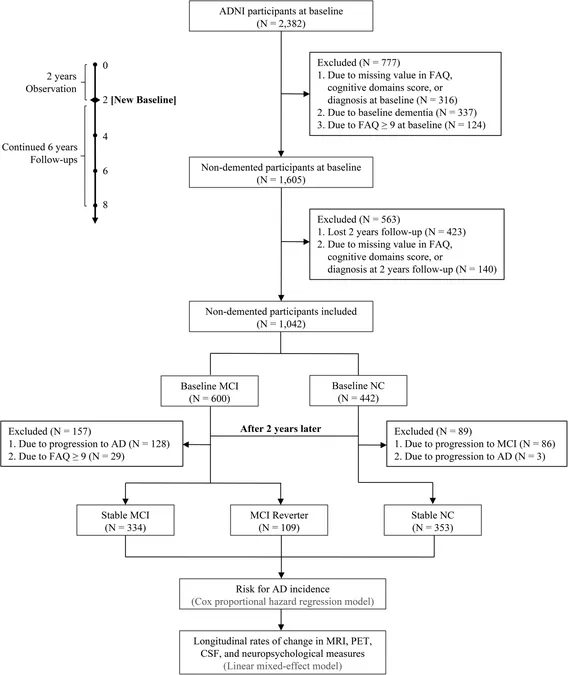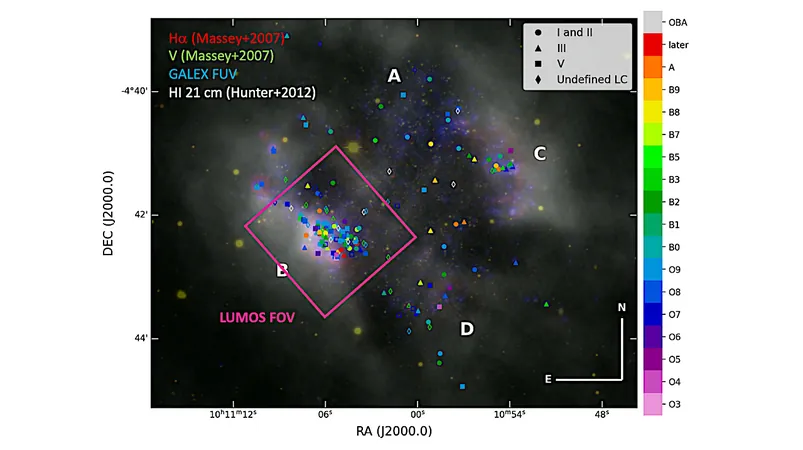
Unlocking the Mystery: Can Mild Cognitive Impairment Truly Revert to Normal? A Deep Dive into Longitudinal Findings
2025-05-05
Author: Wei Ling
Breaking Down the Study and Its Implications
In an exciting exploration of cognitive health, a recent longitudinal study has tackled the intriguing question of whether individuals with Mild Cognitive Impairment (MCI) can revert to a state of normal cognition. Drawing on a wealth of data collected from the Alzheimer's Disease Neuroimaging Initiative (ADNI) — which has steadily gathered insights since 2004 — the research spans multiple cohorts and years, diving deep into the clinical features and outcomes of participants.
The Participant Landscape: Who Are They?
The study centered on over 2,200 individuals, comprising 600 diagnosed with MCI and 442 who were cognitively normal (NC). These participants underwent a comprehensive assessment involving MRI scans, cognitive testing, and biological sample analyses. With a maximum follow-up of eight years, the researchers scrutinized cognitive changes over time, categorizing participants based on their cognitive trajectory. Notably, some MCI patients remarkably reverted to NC status after two years.
Cognitive Measures: What Did They Discover?
Cognitive abilities were rigorously evaluated using the Alzheimer's Disease Assessment Scale-Cognitive 13 (ADAS-cog 13). The findings revealed a stark contrast: MCI reverters displayed seemingly healthier cognitive profiles compared to those with stable MCI. They boasted larger hippocampal volumes, lower amyloid levels, and better performance on memory and executive function tests.
The MRI and PET Imaging Insights: What Lies Beneath?
Advanced MRI and PET technologies illuminated the brain's structural and metabolic status. Findings indicated that MCI reverters exhibited slower brain atrophy rates and healthier metabolic profiles compared to their MCI counterparts. This suggests that not only is cognition improving, but brain health is also characterized by reduced neurodegeneration.
CSF Biomarkers: A Window into Alzheimer's?
The study's analysis of cerebrospinal fluid (CSF) biomarkers indicated that while MCI reverters showed lower levels of certain pathological markers, the differences in amyloid and tau protein accumulation were less pronounced. This raises questions about the mechanisms leading to cognitive improvement and the relationship between MCI and Alzheimer's pathology.
Diving into Risk Factors: What’s the Takeaway?
Interestingly, while reverters demonstrated a significantly lower risk for developing Alzheimer’s dementia compared to stable MCI patients, they did face an increased likelihood of cognitive decline when juxtaposed with the stable NC group. Approximately 20% of individuals diagnosed with MCI reverted to normal cognitive status, aligning with previous findings and highlighting variability in individual cognitive trajectories.
Significance of the Findings: What Does This Mean?
This compelling study underscores the potential for cognitive rehabilitation and the complex nature of MCI. It challenges the notion that memory loss is strictly linear. The findings suggest that interventions could possibly aid patients with MCI to regain cognitive ground.
Looking Ahead: What’s Next for MCI Research?
The study's findings pave the way for future research exploring the intricacies of MCI. Investigating why certain individuals revert to normal cognition while others do not may provide crucial insights into preventive strategies against cognitive decline. Furthermore, understanding the biological underpinnings can help in structuring effective early interventions and identifying at-risk populations.
Conclusion: A New Hope for Cognitive Health!
As neuroscience continues to advance, this study offers a glimmer of hope for individuals grappling with MCI. With ongoing research and longitudinal studies, the journey towards understanding and potentially reversing cognitive impairment is an exhilarating frontier in medicine.




 Brasil (PT)
Brasil (PT)
 Canada (EN)
Canada (EN)
 Chile (ES)
Chile (ES)
 Česko (CS)
Česko (CS)
 대한민국 (KO)
대한민국 (KO)
 España (ES)
España (ES)
 France (FR)
France (FR)
 Hong Kong (EN)
Hong Kong (EN)
 Italia (IT)
Italia (IT)
 日本 (JA)
日本 (JA)
 Magyarország (HU)
Magyarország (HU)
 Norge (NO)
Norge (NO)
 Polska (PL)
Polska (PL)
 Schweiz (DE)
Schweiz (DE)
 Singapore (EN)
Singapore (EN)
 Sverige (SV)
Sverige (SV)
 Suomi (FI)
Suomi (FI)
 Türkiye (TR)
Türkiye (TR)
 الإمارات العربية المتحدة (AR)
الإمارات العربية المتحدة (AR)